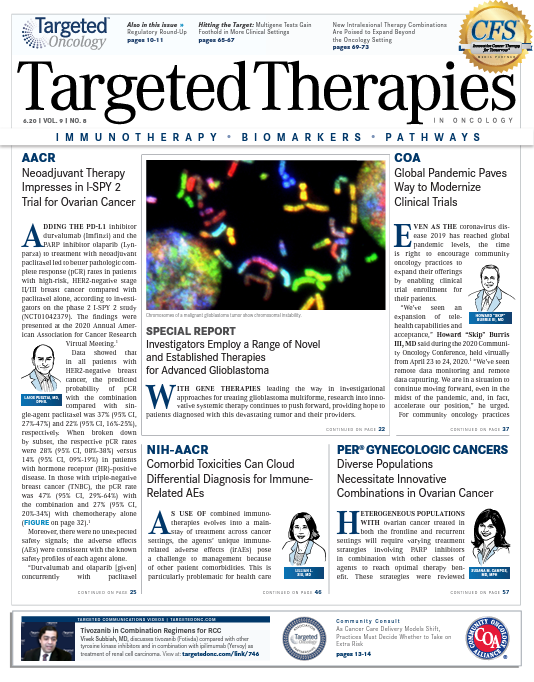Anti–PD-1/PD-L1 Immunotherapies Continue to Impress in Unique Combinations
"In all, these 3 exciting trials combining PD-1 or PD-L1 inhibition with targeted therapy, chemotherapy, or immune cell therapy bode well for evolving advances with this tolerable class of agents."
Robert L. Ferris, MD, PhD

Even during times of coronavirus disease 2019, exciting cancer research is showing us the path forward with new combinations in difficult-to-treat cancers. Thankfully, the virtual American Association for Cancer Research (AACR) Annual Meeting 2020 continued to transmit exciting findings, including some from clinical trials. Grant McArthur, PhD, from the Peter MacCallum Cancer Center in Melbourne Australia, presented the IMspire150 trial (NCT02908672), whose results showed that atezolizumab (Tecentriq) combined with vemurafenib (Zelboraf) and cobimetinib (Cotellic) improved progression-free survival (PFS) and extended duration of response compared with vemurafenib and cobimetinib alone, which target BRAF and MEK. This phase 3 trial enrolled patients with BRAF V600–mutant advanced melanoma, in which a combination of BRAF/MEK inhibition demonstrated substantial responses. The sweet spot of immuno- oncology, of course, is enhanced durability and overall survival. Thus, combining atezolizumab, a PD-L1 inhibitor immunotherapy, with targeted therapies demonstrated a median PFS of 15.1 months compared with 10.6 months with the targeted agents alone.
Likewise, another PD-L1 combination pairing durvalumab (Imfinzi) with the PARP inhibitor olaparib (Lynparza) was used with neoadjuvant paclitaxel to increase pathologic complete response (pCR) in patients with high-risk, HER2-negative, stage II/III breast cancer compared with paclitaxel chemotherapy alone. This trial was one of the arms of the phase 2 I-SPY 2 study (NCT01042379), also presented at the virtual AACR meeting. The combination of immune checkpoint therapy with a PARP inhibitor is driven by blocking nucleotide and base excision repair to Robert L. Ferris, MD, PhD Director Hillman Cancer Center University of Pittsburgh Medical Center Pittsburgh, PA increase mutational and neoantigen burden. Thus, DNA fragments may also activate the intracellular inflammatory STING pathway. PARP inhibition can also increase expression of PD-L1 in breast cancer cells. As such, the rational design of durvalumab and the PARP inhibitor was tested in this arm of the I-SPY 2 multicenter neoadjuvant trial. This innovative, response-adaptive randomization trial compared multiple experimental arms with a shared control arm using a Bayesian predictive probability. The objective response rate was 63.3% with the combination, resulting in a pCR rate of 47% versus 27% with paclitaxel alone. This has an estimated probability of a superior experimental arm to chemotherapy alone of 98% in all subsets of patients. Pushing the cell therapy field forward, Caron A. Jacobson, MD, medical director, Immune Effector Cell Therapy Program at the Dana-Farber Cancer Institute and assistant professor of medicine, Harvard Medical School, in Boston, Massachusetts reported the findings of the ZUMA-6 trial (NCT02926833), which evaluated chimeric antigen receptor (CAR) T-cell therapy combined with atezolizumab in patients with refractory diffuse large B-cell lymphoma, at the AACR conference. The trial was blocking PD-L1 on active CAR T cells at different time schedules and demonstrated safety and tolerability.
In all, these 3 exciting trials combining PD-1 or PD-L1 inhibition with targeted therapy, chemotherapy, or immune cell (CAR T-cell) therapy bode well for evolving advances with this tolerable class of agents.

Gasparetto Explains Rationale for Quadruplet Front Line in Transplant-Ineligible Myeloma
February 22nd 2025In a Community Case Forum in partnership with the North Carolina Oncology Association, Cristina Gasparetto, MD, discussed the CEPHEUS, IMROZ, and BENEFIT trials of treatment for transplant-ineligible newly diagnosed multiple myeloma.
Read More
Key Trials From ASH 2024 Impact Treatment for Plasma Cell Disorders Going Forward
February 20th 2025Peers & Perspectives in Oncology editorial board member Marc J. Braunstein, MD, PhD, FACP, discussed the significant advancements in multiple myeloma treatment at the 2024 ASH Annual Meeting and Exposition.
Read More